 Pamela Starr (right) at a LAWAC Global Cafe Breakfast.
Pamela Starr (right) at a LAWAC Global Cafe Breakfast.Andrés Manuel López Obrador was the favorite candidate going into Mexico’s presidential elections on July 1st, “but nobody expected him to win so overwhelmingly,” said Pamela Starr. He won by 30 points with 53% of the vote, giving him a powerful mandate to change after the very unpopular presidency of the incumbent, Enrique Peña Nieto, whose administration was perceived to be excessively corrupt. “The biggest risk for López Obrador’s presidency will be excessive expectations,” said Starr, an associate professor at USC and director of the US-Mexico Network.
Speaking to a LAWAC Global Café breakfast meeting on July 10th, Starr said that the one-time radical leftist who preached civil disobedience “has matured over the years,” and that today he is more of a progressive than a radical. His policy will be to focus on four elements, according to Starr. First is social policy, including doubling pensions for senior citizens. Secondly he will focus on the younger generation of so-called “ninis” (a Spanish abbreviation of “ni estudia ni trabaja”, meaning “neither works nor studies”). López Obrador will try to get them more education or some apprenticeship for work to keep them from being drawn into the drug wars. Third he will try to have a cooperative relationship with US President Trump, so that he can concentrate on domestic policy. And fourth, in his economic policy he will attempt to boost investment, particularly in the private sector.
But Starr said he will not do anything drastic, like changing the constitution in terms of re-nationalizing the energy industry, which would scare investors away. “He doesn’t want to freak out the markets.” There are serious questions about how López Obrador will be able to pay for his social reforms. Starr said he will try to find money by fighting corruption, which she said “from the perception of Mexicans is worse than it has ever been.”
Mexico also faces an enormous crime problem. “This year is on the path to be the most violent year in modern Mexican history,” said Starr. Already 200,000 people have been killed in the country’s drug wars, which is about half the total number of deaths in the Syrian war. “The solution is simply and profoundly difficult,” said Starr. She said Mexico will have to increase prevention by giving young people other choices to keep them out of the drug business. And Mexico “needs to have a judicial system that functions. Right now 95% of homicides go unsolved.” (In the US 38% of homicides are not solved.)
Starr said she was concerned that Trump might decide to announce the US would pull out of NAFTA in October as a last-minute stunt to try to shore up support in advance of the November mid-term elections in the US. “López Obrador cannot make the concessions that the US is asking for when he is in office,” Starr said, adding she feared that Trump, while initially cordial towards López Obrador after his election, “will eventually antagonize him.”
One of the key issues between the US and Mexico continues to be immigration, although the nature of the problem has changed. “Mexicans aren’t coming to the US as much as they used to,” said Starr. In fact, more Mexicans are now leaving than coming into the US. “The problem is immigration through Mexico to the US by Central Americans,” who are being driven away from their countries by crime and lack of economic opportunity. “Trump needs to stop promising to build a wall and realize that Mexico is the wall,” said Starr, saying that the US and Mexico could work together to reduce the through-flow of migrants. She said one new proposal was for Mexico to stand up a border control police force, something they have not had before.
